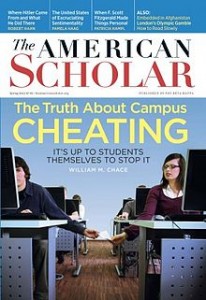[contextly_auto_sidebar id=”1whRNQEaMtG6Y3rKjMLHRzTEwdTzdym6″]
THE American Scholar magazine recently asked me to lay out some of the questions I was left with upon completing my book, Culture Crash. I was glad they asked me for questions rather than answers; the plight of the arts, humanism, the middle class, and art for art’s sake seem so complex and impacted that it’s a lot harder to solve in 800 words. In any case, here’s how they set it up, and my first question:
Freelance journalist Scott Timberg lives in Los Angeles and blogs about art, music, and literature. His new book, Culture Crash: The Killing of the Creative Class, prompted us to urge him to pose questions, based on his research, about the future of American culture.
1. In the three decades after World War II, we saw a movement to elevate culture for the masses. The middlebrow consensus, we could say, tracked with the upheaval of the modern movement in art, architecture, literature, and music. It meant publication of paperbacks of classic novels, the Great Books push, Leonard Bernstein on television, Thelonious Monk on the cover of Time, an expanding English major in colleges and universities, and so on. These days, it all seems like ancient history. Do we have a new, fruitful way to think about culture that goes beyond midcentury middlebrow?
My questions are in the spring issue — see the piece here.

Great list of questions. No. 5 attracted my attention. As a 70-year-old painter and quasi-literate, I discovered one difference between literature and what I would call middlebrow entertainment. I recently read two books I thought endeavored to be “entertaining”, “A Visit from the Goon Squad,” by Jennifer Egan, and “Beautiful Ruins” by Jess Walter. What bothered me about both, I found out, was the author’s condescension. In each case there was an attempt to manipulate me by people who did not consider me their equals. The literature I had recently read, by the likes of William Faulkner and Ingeborg Bachmann, on the other hand, looked me straight in the eye, delivered their best and assumed I could appreciate it. It took a while to realize that middlebrow literature was condescending and the real thing was relatively humble, but that seems to be the case. Of course entertaining writing can be literature of it can be pap. Give me the former, I say. I think the best art is always the best entertainment, though it may disturb or upend your assumptions as well.
Another thought, Mr. Timberg: Your book “Culture Crash” comes out soon after another book, “The Creative Economy,” by John Howkins. I haven’t read either, though both are tempting. But I wonder if one speaks to the other: if we’ve become a “creative economy,” is Howkins dealing with innovations of merely a technological kind, or a cultural kind? And what does it mean if our economic survival would seem to depend on our creativity when the arts here have been squeezed, marginalized, trasnhed? Will we have to import our creativity from Asia and Europe? Wonder if you could devote a blog sometime to the relationship of these two themes. Perhaps they’re unrelated. I don’t know.
It just could be that in America after WWII the means of production of goods in general (due to the war) finally tipped to mass production, making available what where once luxuries available to (almost) all,. and in terms of the arts, the same.
There was also a culture war during that time which was included in the more militaristic Cold War propaganda, and I think more “middlebrow” critics accused the promoters of Abstract Expressionism as being a part of it.
If we now can combine the democratization of the arts (due to mass production of goods) and a new (due to technology, i.e. – the internet) multicultural view of the world, we are in a much better place than those years after WWII, where choices were still dominated by white euorocentric examples of the arts.
In response to Curt….I read four books – A Visit from the Goon Squad, Cloud Atlas, Extremely Loud & Incredibly Close, and The Autograph Man, all of them manipulating the more traditional form of the physical aspects of the novel. I did not find them condescending at all. I believe that the authors were reacting to and making manifest their take on new technology. Maybe one could argue that they are merely competing with other newer media, but I say…so what? If it is the case, at least books can still be books, but change in a meaningful way (not middlebrow entertainment).